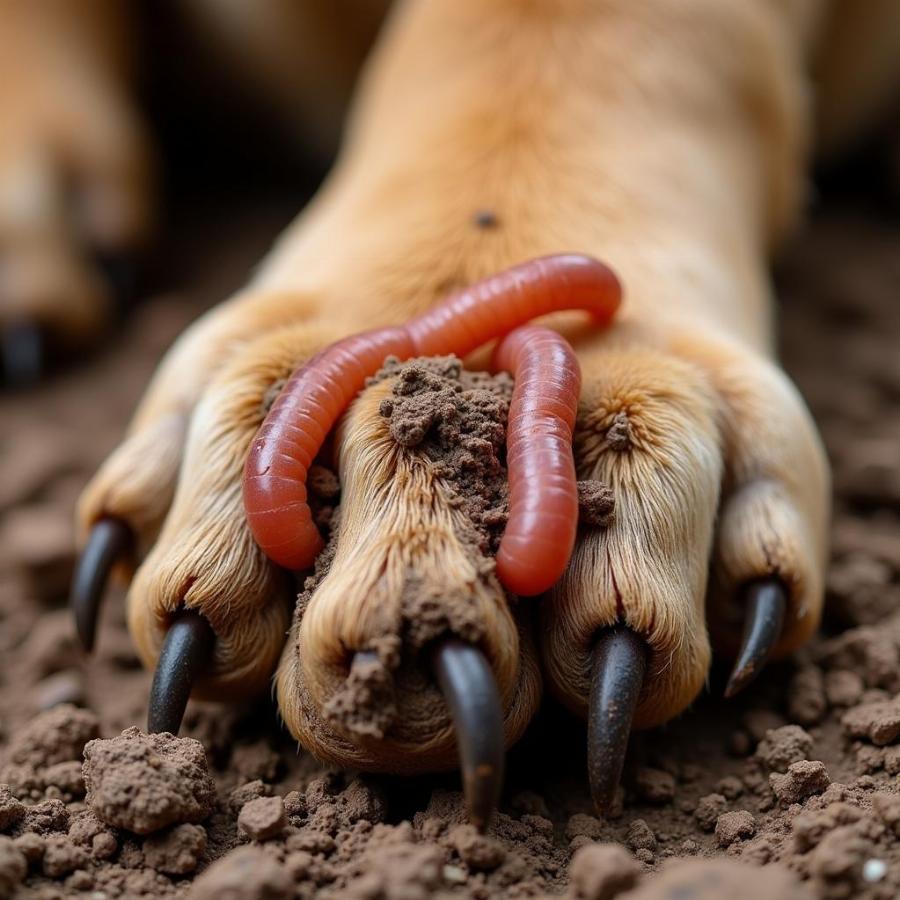Hookworm disease in dogs, a serious parasitic infection, can significantly impact your furry friend’s health. These tiny parasites latch onto the intestinal wall and feed on blood, potentially leading to anemia, weakness, and other complications. Understanding how to prevent, identify, and treat hookworms is crucial for every dog owner.
Understanding Hookworm Infections
Hookworms are intestinal parasites that affect dogs of all ages, breeds, and lifestyles. These parasites are particularly dangerous for puppies and dogs with weakened immune systems. The two most common types of hookworms affecting dogs are Ancylostoma caninum and Ancylostoma braziliense. These parasites thrive in warm, moist environments and can be transmitted through contaminated soil, feces, and even the mother’s milk. Recognizing the signs and understanding the transmission methods is essential for effective hookworm prevention.
How Hookworms are Transmitted
Hookworm larvae can penetrate the skin, especially the paws, when a dog walks on contaminated ground. They can also be ingested if a dog accidentally eats contaminated soil or feces. Furthermore, puppies can contract hookworms from their mothers during pregnancy or through nursing. This multifaceted transmission makes vigilance crucial in protecting your dog from this pervasive parasite.
 Hookworm Larvae Penetrating Dog's Paw
Hookworm Larvae Penetrating Dog's Paw
Symptoms of Hookworm Infection in Dogs
The symptoms of hookworm infection can vary depending on the severity of the infestation and the dog’s overall health. Common signs include pale gums, weakness, lethargy, diarrhea, and weight loss. In severe cases, hookworm disease can lead to anemia, which can be life-threatening, especially in puppies. Recognizing these symptoms early is key to preventing serious health problems.
Diagnosing and Treating Hookworm Disease
Diagnosing hookworm disease involves a fecal examination by a veterinarian. The vet will examine a stool sample under a microscope to identify hookworm eggs. Once diagnosed, treatment typically involves deworming medications. These medications are designed to kill adult hookworms and prevent further egg production. Your vet will determine the appropriate medication and dosage based on your dog’s age, weight, and the severity of the infection.
The Importance of Veterinary Care
While some over-the-counter deworming medications are available, it’s crucial to consult with your veterinarian for a proper diagnosis and treatment plan. Your vet can determine the specific type of hookworm infecting your dog and prescribe the most effective medication. Additionally, they can monitor your dog’s progress and address any complications that may arise. Similar to ensuring your dog receives their heartworm pills dogs regularly, consistent veterinary care is vital for their overall health and well-being.
Preventing Hookworm Infections
Prevention is the best defense against hookworm disease. Regularly cleaning up your dog’s feces is crucial in preventing the spread of hookworm eggs. Maintaining a clean living environment for your dog also helps reduce the risk of infection. Additionally, regular veterinary checkups and fecal examinations are essential for early detection and treatment.
Maintaining a Clean Environment
Keeping your dog’s living area clean and free of feces is paramount. This simple step can significantly reduce the risk of hookworm infection. Regularly cleaning and disinfecting your yard and any areas where your dog frequents can help minimize the presence of hookworm larvae. This is especially important if you have multiple dogs or if your dog experiences fecal incontinence in dogs.
Can Humans Get Hookworms from Dogs?
Yes, humans can contract hookworms from dogs, though it’s usually a different species, Ancylostoma braziliense, causing a skin condition called cutaneous larva migrans. This results in itchy, red tracks on the skin where the larvae burrow. It’s important to practice good hygiene, especially after handling dog waste, to minimize this risk. If you suspect you might have contracted hookworms, consult a doctor. Just as hookworm can cause bloody bowel movement in dogs, it’s crucial to seek professional medical advice for both human and canine health concerns.
Conclusion
Hookworm disease is a serious but preventable condition in dogs. By understanding the transmission methods, recognizing the symptoms, and implementing preventative measures, you can protect your furry friend from this harmful parasite. Regular veterinary care is essential for early diagnosis and effective treatment. Don’t hesitate to contact your veterinarian if you suspect your dog may have hookworms.
FAQ
- What are the most common signs of hookworms in dogs? Pale gums, weakness, lethargy, diarrhea, and weight loss.
- How are hookworms diagnosed? Through a fecal examination by a veterinarian.
- How are hookworms treated? With deworming medication prescribed by a veterinarian.
- Can I prevent hookworms in my dog? Yes, by regularly cleaning up feces, maintaining a clean environment, and providing regular veterinary care.
- Can humans get hookworms from dogs? Yes, they can contract cutaneous larva migrans, a skin condition.
- How often should I deworm my dog for hookworms? Consult your veterinarian for a tailored deworming schedule.
- Are there any home remedies for hookworms in dogs? No, always consult a veterinarian for diagnosis and treatment.
Further Reading
Learn more about other important health topics for your dog: milbeguard for dogs and eosinophilic keratoconjunctivitis dog.
Beaut Dogs is your trusted source for comprehensive and reliable information on all aspects of dog care. From breed selection to health and nutrition, we are dedicated to empowering dog owners with the knowledge they need to provide the best possible care for their beloved companions. When you need expert advice, contact us at Email: suport@beautdogs.com for detailed and accurate answers from Beaut Dogs. Visit us at https://beautdogs.com for more helpful resources.